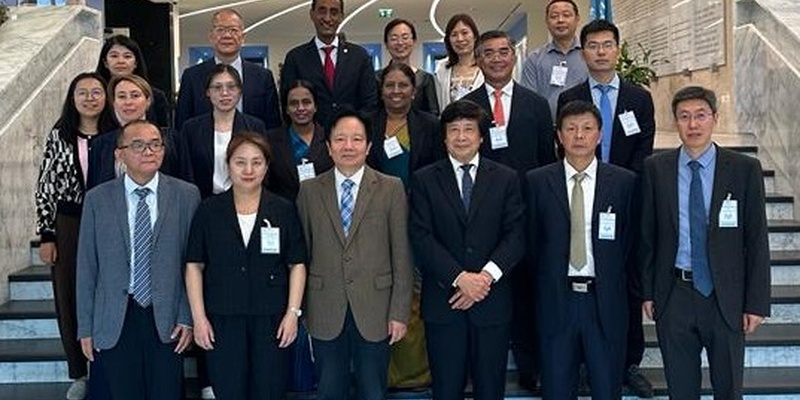Sri Lanka and Cambodia make progress in strengthening phytosanitary capacities, thanks to South- South Cooperation.
Posted on Thu, 30 Nov 2023, 12:00

© IPPC Secretariat
Rome, 21 November 2023. The International Plant Protection Convention (IPPC) Secretariat recently commemorated the successful conclusion of project activities under the FAO-China South-South Cooperation (SSC) Programme with a focus on Sri Lanka and Cambodia in October 2023. The IPPC-led project titled “Strengthening the Capacity of Developing Contracting Parties to Implement the International Plant Protection Convention (IPPC) under the Framework of the FAO-China South-South Cooperation (SSC) Programme” aims to ensure that consignments of plants and plant products meet the required phytosanitary standards needed for international trade, while supporting farmers to gain market access for agricultural produce.
Under the stewardship of Jingyuan Xia, former IPPC Secretary and currently Special Advisor to the Director-General of the Food and Agriculture Organization of the United Nations (FAO) and Sarah Brunel, Implementation Facilitation Unit Lead at the IPPC Secretariat, this collaborative project has been central to increasing phytosanitary capacity of national plant protection organization (NPPO) staff and stakeholders in these two countries.

© IPPC Secretariat
Successes, closing and next steps
One of the most significant achievements of the project has been the phytosanitary capacity evaluation (PCE) undertaken in Cambodia and Sri Lanka. The PCE is a comprehensive exercise involving multiple phases of process-based assessments with distinct modules that countries undertake to identify gaps in and opportunities for improving their national phytosanitary systems. A PCE is led by an NPPO, supported by a certified facilitator and the IPPC Secretariat. In both countries, PCE activities included arranging consensus workshops with relevant stakeholders and NPPO officers of Sri Lanka and Cambodia. The workshop increased the awareness of high-ranking officials and policymakers about the PCE and its significance.
Through the PCE process, the two countries were able to identify gaps in their national plant health systems, identify areas for improvement, draft National Phytosanitary Capacity Development strategies, which included revising national phytosanitary legislation, and secure external funding to implement required improvements.
The project also helped to strengthen national capacity on integrated pest management (IPM). Cambodia successfully held training on phytosanitary measures, IPM technologies to combat Banana Fusarium wilt, and had field demonstrations of new Chinese technologies. Sri Lanka on the other hand, benefited from technical training workshops for NPPO staff and stakeholders, on surveillance, species identification, mass rearing and treatments of fruit flies on mango.
Following their success, Sri Lanka and Cambodia were the highlight of a wrap-up meeting held in October 2023, to mark the end of the project’s activities.
Both countries highlighted the impact of the project on strengthening their phytosanitary systems, strengthening the technical expertise of their staff, improving stakeholder relations at national and international levels, and increasing the visibility of the work of NPPOs, among the local policy makers. The project is estimated to have impacted thousands of beneficiaries in the plant health community, including farmers, agricultural staff and policy makers in the pilot countries and globally.
“As we are currently facilitating trade negotiations with China, this project has been a critical platform for us to learn from the best practice surveillance programmes of China and through PCEs, to improve our operations and meet the import requirements," said Champika Hewage, Director of the National Plant Quarantine Service in Sri Lanka.
“Through this project we have established strong networks. We are full of hope for the future and hope to work together to support global phytosanitary measures and to expand the knowledge gained,” said Jingyuan Xia in his closing remarks.
Finally, the wrap-up meeting developed plans for regional workshops on sustainable prevention and management of mango pests and diseases, including fruit flies, in Asia. These workshops are intended to build on the project’s success and help countries strengthen their phytosanitary capacity further.
Related information

